 I vår artikkelserie "Mental Skills for Mentors and Referee Instructors" fra den meritterte dommerinstruktøren Alan Richardson fra England bringer vi en ny artikkel som tar for seg elementer knyttet til dommerpsykologi. Serien på 10 artikler fokuserer på hvordan en mentor eller dommerinstruktør bør jobbe med å utvikle dommere, og ikke minst litt om de mentale ferdighetene som da er aktuelle. De fleste bør kunne plukke opp noen gode råd fra Richardsons artikler, både dommere og instruktører, og her kommer den fjerde i serien. Dagens fokusområde er et alltid like aktuelt tema: "Developing Training Techniques for Concentration".
I vår artikkelserie "Mental Skills for Mentors and Referee Instructors" fra den meritterte dommerinstruktøren Alan Richardson fra England bringer vi en ny artikkel som tar for seg elementer knyttet til dommerpsykologi. Serien på 10 artikler fokuserer på hvordan en mentor eller dommerinstruktør bør jobbe med å utvikle dommere, og ikke minst litt om de mentale ferdighetene som da er aktuelle. De fleste bør kunne plukke opp noen gode råd fra Richardsons artikler, både dommere og instruktører, og her kommer den fjerde i serien. Dagens fokusområde er et alltid like aktuelt tema: "Developing Training Techniques for Concentration".
Part 4: Developing Training Techniques for Concentration
“90% concentration equals 100% failure”.
Concentration is the ability to “be able to focus attention on one aspect of performance for the time necessary to be successful”. Concentration skills are essential if officials are to be trained to deal with a transitional game of speed, variation and unfolding physical situations. They are vital if officials are to meet the challenge of complex tactical plays in games that can induce many distractions.
Officials who cannot maintain concentration are subject to several elements that can undermine good performance. These include:
- Loss of focus – failure to recognise and deal with changes in the flow of the game.
- Loss of intensity – decline in the power of focus through complacency (over confidence), choking (fear of failure) and fatigue (decline in energy).
Games played over four periods can be decided in one moment of play. Every game will contain significant situations when an official defines a moment or the moment defines an official. A lapse of concentration often determines that moment. Part of shaping officials´ attitudes towards a mentally tough performance is helping them become aware of and prepare for defining moments.
Concentration brings success
Officials must learn to recognise and make sense of the flow of the game, the continuous stream of images as players and the ball constantly change position. Each official, relative to their position on court, must learn to focus on situations developing within their area of control, whilst at the same time maintaining a peripheral view of the game without being distracted by situations that are less important and not within their area of control.
Doing this is not easy. For some officials, it proves to be a weakness that prevents them progressing, but anyone can develop the ability. Concentration is a habit, not a talent and it requires motivation and constant practice.
Officials will experience two main situations on the court that demand different levels of concentration:
- Primary responsibility – the action during the game, which IS in the official´s area of the court and for which that official, has primary responsibility. This requires total (100%) concentration.
- Support responsibility – the action during the game, which is NOT in the official´s area of the court but for which they can provide help and support IF necessary. This area has a relaxed concentration level for that official.
If officials can understand the concept of concentration, switching onto a narrow focus with high intensity (ON THE BALL) and then smoothly switching off to a wider view with low intensity (OFF THE BALL), then they will begin to reduce the number of mental lapses and start winning the defining moments.
Diagram 1 Lead Referee Concentrations Areas (2 man mechanichs)
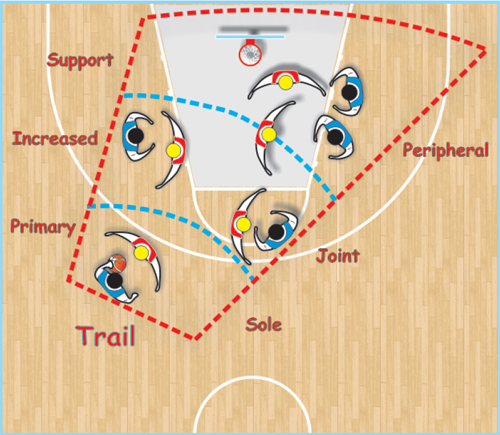
Diagram 2 Trail Referee Concentrations Areas (2 man mechanichs)
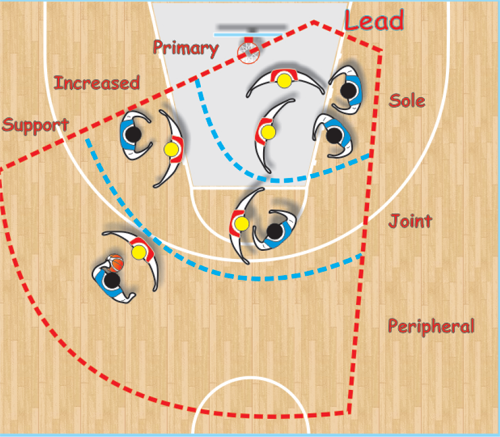
Diagram 3 Lead Referee Concentrations Areas (3 man mechanichs)
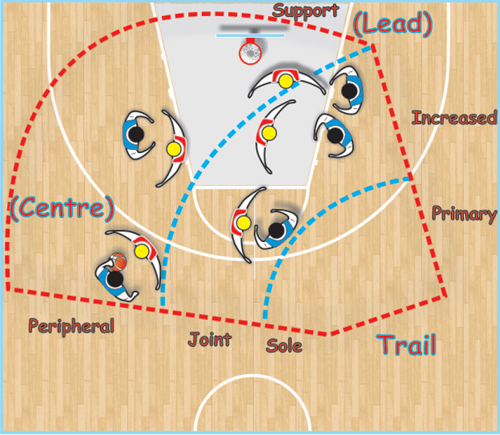
Diagram 4 Trail Referee Concentrations Areas (3 man mechanichs)
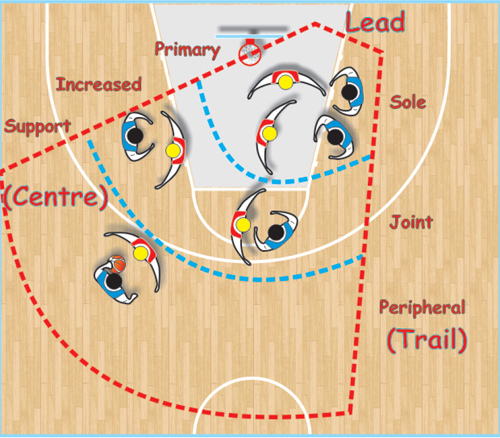
Diagram 5 Centre Referee Concentrations Areas (3 man mechanichs)
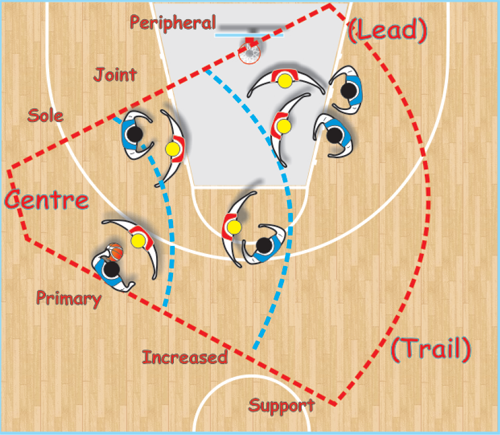
In diagrams 1 and 2 we look at the primary (sole), increased (joint) and support (peripheral) responsibility of the lead and trail referees in the 2 man mechanics system.
In diagrams 3, 4 and 5, we look at the primary (sole), increased (joint) and support (peripheral) responsibilities of the lead, trail and centre officials in the 3-man mechanics system.
Officials must learn, by reviewing the flow of the game, when to switch from “ON BALL” responsibility to “OFF BALL” responsibility. They must also be aware of the danger of allowing inner thoughts and feelings to disrupt this process.
Feelings of frustration, anger and/or fatigue can interfere with the process of concentration. The referee can find himself/herself, paying more attention to an “inner world” rather than to the “outer world” of the game. Fatigue makes cowards of all of us; causing us to concentrate on what WE want, rest, rather than what the game is demanding from us.
Quality practice is essential
Learning to manage focus and intensity begins in training and preparation. Only later can officials transfer it to the game situation. Officials must accept the link between training and competition and be willing to train at an intensity that can be transferred. It is no good training at 60%, when 100% is required during the game. How you practice is how you perform.
Laws of Training
There are four laws of training to achieve focus and intensity:
- Law 1. The purpose of training is to develop technical, tactical and mental skills (habits).
- Law 2. Whatever officials need to do in a game they must first do it in training and preparation.
- Law 3. Being able to train and prepare at a consistently high level requires clear purpose, focus and intensity.
- Law 4. Consistent training and preparation leads to consistent successful performance.
Developing focus and intensity in training and preparation
FOCUS
- Conducting realistic and demanding preparation -> Assessing the quality of preparation
- Preparing and teaching -> Knowing what to focus on.
- Knowing when to relax -> Recognising defining moments.
- Managing mistakes without loss of focus -> Recovering focus after mental lapses.
- Using self-talk or physical action to activate focus -> Using words or gestures that activate focus.
- Punishing loss of focus -> Rewarding and reinforcing good focus.
INTENSITY
- Using prepared relaxation to build energy -> Building physical and mental fitness levels to accommodate high intensity.
- Establishing control over emotional arousal -> Using positive self-talk and being totally committed.
- Being prepared for and avoiding distractions -> Concentrating on what can be controlled and ignoring the uncontrollables.
- Knowing when to move between active, semi-active and relaxed states of focus -> Recognising when key moments require extra intensity and being able to step up.
Summary
Concentration is a key element in successful officiating. It is a skill which must be practised regularly and reviewed through a variety of options. The ability of officials to know when to switch from “ on ball” to “off ball”, to be able to recognise changes in the flow and intensity of the game, to be able to recognise defining moments and to deal with emotional pressure, will determine which officials will progress to higher levels and maintain those levels throughout the season.
Alan Richardson
